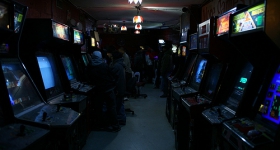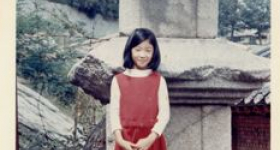Image courtesy of Cecile Lusby
How can anyone explain a man who lived two lives? I try to unravel the mystery of Richard Aoki,
because in 2012 Seth Rosenfeld reported that Richard served as an FBI
informant. I view Richard’s life as having two turning points: one in 1956-7,
and then again in 1966-1967, as he formed a new identity through the ‘60s
activism that transformed and radicalized him.
Disclosures about Richard’s work with the FBI have been hard for his
contemporaries, his students -- and for me -- to accept. My knowledge of
Richard began in 1966 as he was leaving the Socialist Workers Party and joining
the newly organized Black Panther Party. He joked about his earlier
conservatism and his vote for Nixon in 1960 before his political ideas evolved.
He voiced contempt for the student socialists who read, but never risked
action. “I’m down for the struggle,” Richard would say. He did have a history.
Richard’s father disappeared in 1956, so
he moved to Berkeley to live with his mother. Sometime during 1956 Richard “cut
a deal” with the court to expunge his juvenile offenses so he could graduate
and enter the military. Leaving Berkeley High in January 1957, Richard saw his
future and his options open up in the Active Reserves. He needed money and a path to a career or
college that the Army could provide.
Rosenfeld mentions an FBI agent, Burney
Threadgill, who claimed to have developed Richard in 1957, after picking up his voice on
a wiretap talking to the son of Communist Party members. The agent suggested that
Richard go to political meetings and report back personally. Threadgill’s revelation
leaves the possibility that Richard could have been coerced into working as an
informant. It is also possible that curiosity led Richard to the FBI voluntarily
while still in his teens. Later, curiosity would change his course again.
My Connection to Richard
I met Richard Aoki when I was a divorcee of 24
and he was a bachelor of 27. In autumn
1966 he was preparing to leave the Socialist Workers Party over what he
believed was its inattention to the struggle for Black liberation in the USA. Richard
was an attractive paradox: Asian in appearance, he spoke like a Black man. Six
months later we began a romance lasting from late April 1967 to 1968. We
drifted apart over his long absences in the Third World Liberation Strike at UC
Berkeley late in 1968, but we remained friends for the next 40 years. I found
him conscientious and sincere in his dedication to the Black Panthers.
As far as his FBI file goes, there is
nothing much to see -- since most pages are whited out. I looked for dates from the years when I was
with Richard and tried to match events in my life. A June 1967 entry shows a
cluster of initials on the page, with FBI number “p. AOKI 189.” The initials
appear beside a demand for an overdue report and a series of postponements --
with a final extension to November 24. It was pretty clear that the FBI was not
getting the reports it wanted from him.
I googled November 24, 1967; it was the day after Thanksgiving. On
November 23rd, Richard showed up in full Panther uniform and under
the influence to pick me up after dinner at my father’s house. He was simply
crazy that night, barking orders in front of my father, demanding that I get my
children in his car if I wanted a ride home. I rushed outside and Richard drove
from Richmond to Berkeley like a madman, bumping into two cars along the way.
When I got home, I rushed inside, locked the door, and did not speak to him again
for weeks. The FBI’s long postponed deadline would have been the next
morning. I am now certain that his
extreme and out-of-character behavior was due to alcohol intake over that deadline,
the weight of his resistance the night before the report was due, and his
unwillingness to inform on the Panthers.
A few weeks later we were back together. Richard always had news and
dramatic tales of what he’d been up to. To be near Richard was to approach the
heart of The Movement.
He would show up some weekends to
take the kids out for pancakes. He could never tell what the day might bring,
so he loved to be fortified by a big breakfast. We made quite an entrance: a
Japanese American male, a white female, and two little African American
toddlers. It was an unusual picture of America, even in Berkeley.
My son remembers Richard teaching him to tie his shoes; my daughter
recalls him showing her how to spell “Free Huey” on her blackboard, and in the
last year, many of the students he mentored have pondered his generosity and
humor. We all thought we knew him.
All these gifts, upon reflection, are the
best of the man. The Ethnic Studies Department still exists at UC Berkeley, and
Richard’s memory endures. Richard
explained himself in a series of interviews filmed by the Peralta Colleges in
October of 2008, six months before he died, to review his legacy (anyone can
see them on YouTube). He says not a word about his other life, but there was
always more to Richard than we ever knew.
***
Cecile Lusby is a freelance writer who
moved from Berkeley to Sonoma County more than forty years ago. She is a
retired English teacher and school counselor who has written a memoir, Lullabies
From Liberty Street. Her website is at cecilelusby.com.









Comments